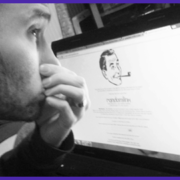You can’t be a copywriter unless you’ve worked in advertising—or can you?
By Gary Walder
Can you be a copywriter without ever having worked for an advertising agency? A quick online search for a definition would suggest that copywriting and advertising go hand in hand.
For example, Wikipedia states that a copywriter is “a person who writes the text of advertisements or publicity material.”
Similarly, the Merriam-Webster online dictionary defines the role as “someone whose job is to write the words for advertisements” while The Free Dictionary suggests it is “one who writes copy, especially for advertising.”
So the answer appears to be an unequivocal ‘No’, you can’t be a copywriter unless you’ve worked for an advertising agency.
But is that truly the case or do these definitions squeeze the modern copywriter into a very specific box? Would it be more appropriate to broaden the definition to take in a much wider range of writing skills developed outside the advertising business?
The ability to write an eye-catching headline, persuasive and compelling body copy or a never-to-be-forgotten slogan is very important, but there are many more ways to connect with customers than through ‘classic’ advertising. Video, brochures, Facebook posts, tweets, speeches, website texts, whitepapers and marketing case studies are all used to deliver messages to key stakeholder groups and all fall under the remit of the modern copywriter.
 Of course there will always be a need for specialists, those who focus on a particular type of writing, but we should not underestimate the value of the generalist, those who can write in a range of styles for a broad range of media. Whether specialist or generalist, it’s being able to write well that matters most.
Of course there will always be a need for specialists, those who focus on a particular type of writing, but we should not underestimate the value of the generalist, those who can write in a range of styles for a broad range of media. Whether specialist or generalist, it’s being able to write well that matters most.
So let’s re-write the definition: “A copywriter is someone who uses writing in a range of styles and in a variety of media to connect businesses with their customers.”
Is this a more accurate, all-encompassing definition?








 capture-copywriter-collective
capture-copywriter-collective